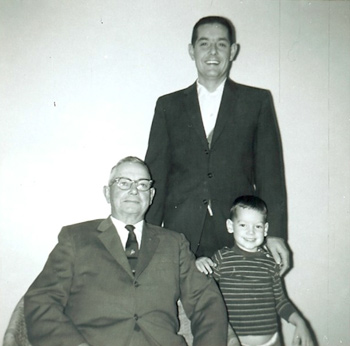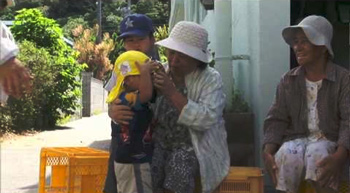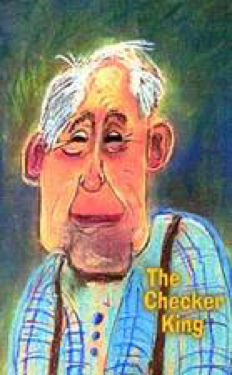A man is not old until regrets take the place of dreams.
– John Barrymore
Until recently, we humans spent our time with people of all generations. Growing up, my father’s whereabouts were monitored by a network of community elders that had known him his entire life. This is no longer true. In fact, as author, Robert Bly describes we are now living in “sibling societies” – educated away from those outside our horizontal gaze.
Over the past two decades, a growing body of literature is beginning to emerge that describes a trend in which the young and the old are becoming increasingly disconnected. This age segregation has been linked to a decline in life satisfaction in the elderly, and an increase in negative stereotypes toward the aged and aging among our youth.
According to Yale psychologist Becca Levy, “Age stereotypes are often internalized at a young age – long before they are even relevant to people,” and early attitudes tend to be reinforced over a lifetime.
To call something old in our culture is an insult, as in old hat or old ideas. To call something young is a compliment, as in young thinking or young acting.
Maggie Little, the Director of Georgetown’s Kennedy Institute of Ethics, worries that our culture is in a state of denial about aging. “The notion of what we’re supposed to look like comes from celebrities and it’s really distorted,” she says. “As a culture, we’ve developed this very narrowed view of beauty — only one decade, the 20s. We spend adolescence gearing up for this peak, and then we spend the rest of our lives trying to reclaim it.”

Here you'll find some of my musings that I think will help support the narrative, and provide some additional information. Check it out here


When Clarence Gould was courting Leona Klinger he would walk to her farmhouse every Friday night with a carefully selected piece of sheet music. Under her parent’s watchful eye they would sit together on the “davenport”, and just before Clarence needed to leave, Leona would go to the piano and perform the song he had brought her the week before. The following morning Leona would take the new composition, and lovingly begin preparing for Clarence’s next visit.
With two witnesses by their side, Clarence and Leona were married on November 15, 1922. My father was born in the midst of a blizzard, as Leona was transported to the doctor in a horse drawn wagon. Twenty-five years years later Clarence and Leona became my grandparents. I am now 53 years old and they have been gone for many many years. While absence often has a way of softening one’s hold, I draw on my memories of them now more than ever. They were my first windows into what it takes to sustain a marriage, relate to grown children, and forge a meaningfully existence when the demands of life are gone. They also provided me my first glimpse into how people respond to their own mortality.
The metaphor of aging as visiting another country is at least 1,500 years old. “The trouble”, author Mary Stanton points out, “is old age is not interesting until one gets there. It’s a foreign country with an unknown language to the young and even the middle-aged.” If true, that’s unfortunate because the last phase of life is simply the result of all the stages that came before. It is arguably the best part of the story. It is how the book ends. To fully understand what old age means we must appreciate it as part of the entire course of human life.

Other cultures seem to get it. There is an African tribe whose practice it is to punctuate the life-course with a distinctive ritual. When a woman is pregnant, the village women gather around her in a circle and wait until one of them can hear the special song of the unborn child. They sing that song when the child is born. The song is heard again alongside crucial life events: at puberty, at marriage, at death. If that individual goes astray, the village will assemble around the offender to sing that singular song as a reminder of one's true identity, uncorrupted by misbehavior.
Author, Mary Pipher writes, “to learn from the old we must first care for them, and not just in the abstract, but in the flesh – beside us in our homes, businesses, churches, and schools. We want the generations mixed together so that the young can give the old joy and the old can give the young wisdom.”

Approximately 800 miles south of Tokyo is the island group of Okinawa. On the northern part of the main island, the oldest living female population in the world can be found. Filmmaker, Roko Belic, decided to turn his camera on the residents and see what a 100-year-old person looks like when they are 2 or 3 years old.
Roko visited an Okinawa preschool, and arrived just as the children were leaving class to run a footrace through town. Roko followed the pack of kids a few blocks to the starting line, and soon noticed 15 or so grandmothers converging at the finish. As the children raced down the street, these grandmothers sat in chairs waiting to embrace them.
The delighted preschoolers flowed from one grandmother’s arms to another in such a way that it was difficult for Roko and his film crew to distinguish which grandmother belonged to which child. As the preschoolers prepared to return to the classroom, Roko asked the teacher for help. “Oh you misunderstood”, she said. “None of these women are related to any of these children. They just live in the neighborhood and came to watch the race.”

My interview with Harry R. Moody
Listen here

My documentary, The Checker King
Watch here

The Checker King Synopsis: "You know how many of us there are who lost their spouses? There are nine million of us. And you know if you're not careful you'll have a lot of suicides because people don't talk to us." – Harold O'Brien
At the age of 68, Harold O'Brien meets the love of his life, Norma, and marries for the first time. Except for a brief period during World War II, Harold has never ventured far from his hometown. But one day, Norma convinces him to enter the Iowa State Checker Championship. With her encouragement and faith Harold wins. A few months later, Norma dies unexpectedly, and Harold begins a six-year struggle with severe depression. Realizing he is suicidal, Harold admits himself into the hospital. One morning, Harold begins thinking about how disappointed Norma would be with his floundering life, and in her memory, decides to enter the National Checker Championship.
This is a warm and inspiring story, that also takes an honest look at the darker realities of aging and depression.

Lost Generation
Watch here
NOTE: Lost Generation is an example of a palindrome, which reads the same backwards as forward. In this case, the meaning is also the exact opposite. This video was submitted in a contest by a 20-year old. The contest was titled "u @ 50" by AARP. This video won second place. When they showed it, everyone in the room was awe-struck and broke into spontaneous applause. So simple, and yet so brilliant.

Legacy Letter Project – In January 2007, I began soliciting people age 50 and older to send letters to my college students. The authors were asked to give insight on what they know now that they wish they would have known when they were in their 20s. I received letters not only from all over the United States, but a few foreign countries as well. They arrived in the form of poems, short stories, eulogies, and more. They shared the wisdom gained from raising a Downs Syndrome child, to surviving domestic violence or breast cancer. Between the lines, they gave glimpses into the change that preceded your arrival. When undergraduate girls were required to pass a swimming test to graduate; or when the Marching Band was made up of only guys; or when a 1964 ivy green Mustang cost only $2,400. At the end of the semester, every student received a personal letter. The response surpassed my wildest dreams, and with the launching of this website, the Legacy Letter Project has grown into a national initiative.
See: http://www.legacyletterproject.com

Carol Alt's Legacy Letter
Read here

One of my friends is the author John Irving, (Cider House Rules, The World According to Garp, A Prayer for Owen Meany, etc.) John starts every novel by first creating the last sentence. Once established, every word of the novel leads to that point. If your life was framed in a similar manner, what would your last sentence be? How would that awareness reshape the way you see your life, and treat the world today?